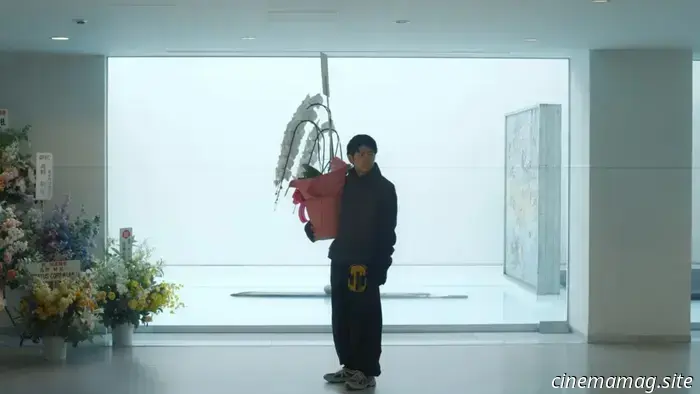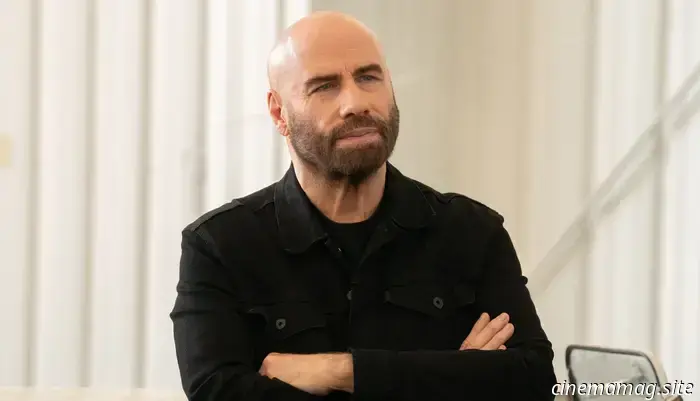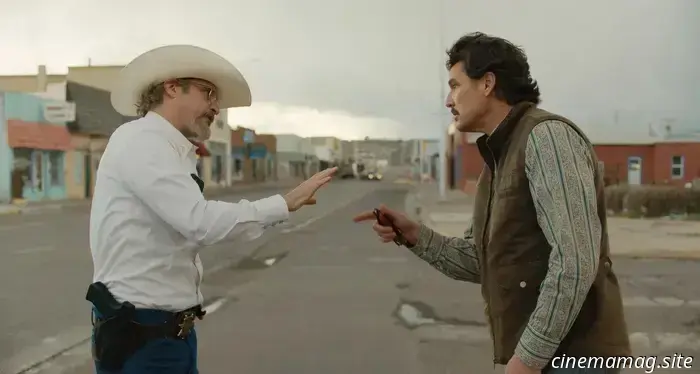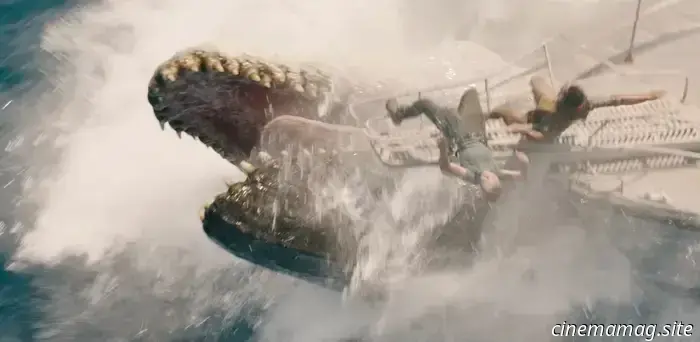
Cannes Review: Brand New Landscape Offers a Unique Take on an Embodied Estrangement Drama
When faced with the past, do you shy away or confront it? Siblings Ren (Kurosaki Kodai, in his debut leading role) and Emi (Mai Kiryu) have been estranged from their father (Ken’ichi Endô) for ten years since he pursued a new job in Tokyo. Ren, now working as a florist, spots a familiar name on a neighboring workstation’s order card. Driven by emotion rather than reason, he takes on the delivery himself, only to find his father gazing back at him through the expansive window of a major exhibition. Holding the floral arrangement tightly, he bears a significant weight.
Yuiga Danzuka’s Brand New Landscape marks his feature debut, intuitively capturing emotional nuances. At 26 years old, Danzuka adopts a snapshot style for depicting his characters and their intertwined lives. He skillfully frames scenes to evoke the profound impact of pivotal moments in our lives. A slightly tilted angle shows a father walking away for good from a balcony; a static, Haneke-inspired portrayal of domestic spaces in wide shots; narrow hallways occupied by a solitary figure; a window through which viewers see the protagonist’s reflection alongside his father and themselves. The film is profoundly embodied, stirringly portraying the intricate pain of estrangement, akin to last year's I Saw The TV Glow's exploration of dysphoria.
A more straightforward film might have narrated events solely from the son's perspective, but Brand New Landscape approaches its subject with a depth and understanding that reflects thoughtful empathy. Sister Emi chooses to avoid looking back, ignoring her fiancé’s warning signs to maintain her forward momentum. Father Hajime embarks on a redevelopment project, starting anew with the land just as he attempts to with his family. Though absent, Mother Yumiko's influence is felt in subtle ways. Danzuka allows his actors the freedom to express their emotions authentically, lending the film a relatable naturalism. Operating largely at a subdued intensity, they express their feelings openly at times, while feeling unable to do so at others.
The title Brand New Landscape is multifaceted. It signifies transformation and reminds us that time cannot revert. It reflects the new lives each family member is forging and the constantly evolving nature of the spaces they occupy and the people with whom they interact. It also highlights the emerging generation of Japanese filmmaking talent, who are making strides to establish themselves both domestically and internationally. Yuiga Danzuka is the youngest Japanese director to feature in Directors’ Fortnight, following in the footsteps of last year’s 27-year-old Yoko Yamanaka and her film Desert of Namibia. Their works are interesting to compare; both serve as blunt challenges to patriarchy, with their young protagonists and filmmakers boldly carving out their own narratives and viewpoints within urban settings.
The film's aesthetic is striking, with a clinical feel that enhances the portrayal of Tokyo's urban landscapes, showcasing an architect’s attention to detail and functionality. The surface similarities to Kiyoshi Kurosawa’s later works focused on isolation are intentional––cinematographer Kôichi Furuya filmed last year’s Chime––but let’s not confuse the two: this film is a unique creation.
Brand New Landscape excels in capturing personal journeys in an unassuming manner; it resonates with something universal. Despite the fragmentation that often follows familial changes, Danzuka’s debut shattered me, serving as a poignant reminder that we can always rebuild.
Brand New Landscape premiered at the 2025 Cannes Film Festival.

Other articles
 Kellan Lutz discusses the Twilight reunion with Cam Gigandet in Desert Dawn - Exclusive Interview
Tai Freligh speaks with Kellan Lutz regarding Desert Dawn… In Desert Dawn, Kellan Lutz (Twilight Saga, Immortals, Extraction) portrays a newly appointed sheriff in a small town, alongside his hesitant deputy, played by Cam Gigandet (Priest, Twilight Saga, Love Hurts). Together, they become embroiled in a complex web of deceit and corruption following the murder of a mysterious individual.
Kellan Lutz discusses the Twilight reunion with Cam Gigandet in Desert Dawn - Exclusive Interview
Tai Freligh speaks with Kellan Lutz regarding Desert Dawn… In Desert Dawn, Kellan Lutz (Twilight Saga, Immortals, Extraction) portrays a newly appointed sheriff in a small town, alongside his hesitant deputy, played by Cam Gigandet (Priest, Twilight Saga, Love Hurts). Together, they become embroiled in a complex web of deceit and corruption following the murder of a mysterious individual.
 John Travolta is set to confront rogue orcas in Renny Harlin's Black Tides.
John Travolta is preparing to face a battle for survival against a group of hungry orcas. According to Deadline, the actor is collaborating with Renny Harlin, known for directing Die Hard 2 and Cliffhanger, for the project titled Black Tides. The survival thriller has been penned by Chris Sparling (Buried) and Ángel Agudo (Apocalypse Z), and will […]
John Travolta is set to confront rogue orcas in Renny Harlin's Black Tides.
John Travolta is preparing to face a battle for survival against a group of hungry orcas. According to Deadline, the actor is collaborating with Renny Harlin, known for directing Die Hard 2 and Cliffhanger, for the project titled Black Tides. The survival thriller has been penned by Chris Sparling (Buried) and Ángel Agudo (Apocalypse Z), and will […]
 DC and Dynamite have officially revealed a crossover featuring Harley Quinn and Elvira.
This August, two pop culture legends are about to meet as Dynamite Entertainment and DC Comics unveil the six-issue crossover series Harley Quinn X Elvira, crafted by the renowned creative duo Amanda Conner and Jimmy Palmiotti, with illustrations by Juan Samu (Elvira Meets Vincent Price). "I’ve been lucky enough to have encountered a lot of wild [...]
DC and Dynamite have officially revealed a crossover featuring Harley Quinn and Elvira.
This August, two pop culture legends are about to meet as Dynamite Entertainment and DC Comics unveil the six-issue crossover series Harley Quinn X Elvira, crafted by the renowned creative duo Amanda Conner and Jimmy Palmiotti, with illustrations by Juan Samu (Elvira Meets Vincent Price). "I’ve been lucky enough to have encountered a lot of wild [...]
 Cannes Review: Ari Aster’s Eddington is an ambitious period film set in the 2020s that succeeds in moments.
In Eddington, Ari Aster’s newest descent into despair, the plan to construct a data center in remote New Mexico triggers a long-awaited psychological collapse. The central figure is Sheriff Joe Cross (Joaquin Phoenix), who deals with a troubling array of issues, including an overly engaged mother-in-law (Deirdre O'Connell), and a seemingly indifferent, catatonic spouse (Emma Stone).
Cannes Review: Ari Aster’s Eddington is an ambitious period film set in the 2020s that succeeds in moments.
In Eddington, Ari Aster’s newest descent into despair, the plan to construct a data center in remote New Mexico triggers a long-awaited psychological collapse. The central figure is Sheriff Joe Cross (Joaquin Phoenix), who deals with a troubling array of issues, including an overly engaged mother-in-law (Deirdre O'Connell), and a seemingly indifferent, catatonic spouse (Emma Stone).
 Jurassic World Rebirth has received a TV spot in anticipation of the new trailer releasing on Tuesday.
As a new trailer is set to be released this Tuesday, Universal Pictures is teasing us for Jurassic World Rebirth with a new TV spot that has surfaced online for the upcoming installment in the blockbuster franchise; take a look below... Five years following the events of Jurassic World Dominion, the planet's ecosystem has largely shown to be unwelcoming to [...]
Jurassic World Rebirth has received a TV spot in anticipation of the new trailer releasing on Tuesday.
As a new trailer is set to be released this Tuesday, Universal Pictures is teasing us for Jurassic World Rebirth with a new TV spot that has surfaced online for the upcoming installment in the blockbuster franchise; take a look below... Five years following the events of Jurassic World Dominion, the planet's ecosystem has largely shown to be unwelcoming to [...]
-sixth-scale-figure-revealed.jpg) Hot Toys has unveiled the sixth scale figure of the Airborne Trooper from the 212th Attack Battalion in Star Wars: Revenge of the Sith.
Hot Toys continues to commemorate the 20th anniversary of Star Wars: Episode III – Revenge of the Sith with the unveiling of the sixth scale collectible figure of the Airborne Trooper (212th Attack Battalion); take a look here… SEE ALSO: Embrace the Dark Side with Hot Toys’ Star Wars: Revenge of the Sith Palpatine […]
Hot Toys has unveiled the sixth scale figure of the Airborne Trooper from the 212th Attack Battalion in Star Wars: Revenge of the Sith.
Hot Toys continues to commemorate the 20th anniversary of Star Wars: Episode III – Revenge of the Sith with the unveiling of the sixth scale collectible figure of the Airborne Trooper (212th Attack Battalion); take a look here… SEE ALSO: Embrace the Dark Side with Hot Toys’ Star Wars: Revenge of the Sith Palpatine […]
Cannes Review: Brand New Landscape Offers a Unique Take on an Embodied Estrangement Drama
When faced with the past, do you flee or confront it? Siblings Ren (Kurosaki Kodai, in his first leading role) and Emi (Mai Kiryu) have been distanced from their father (Ken’ichi Endô) for the past ten years since he opted for a new job in Tokyo. Ren, who is now a florist, observes a
